Unit 3 Careers and skills Integrated skills 课件(共28张PPT)-2025-2026学年译林版(20219)选择性必修第四册
文档属性
| 名称 | Unit 3 Careers and skills Integrated skills 课件(共28张PPT)-2025-2026学年译林版(20219)选择性必修第四册 | 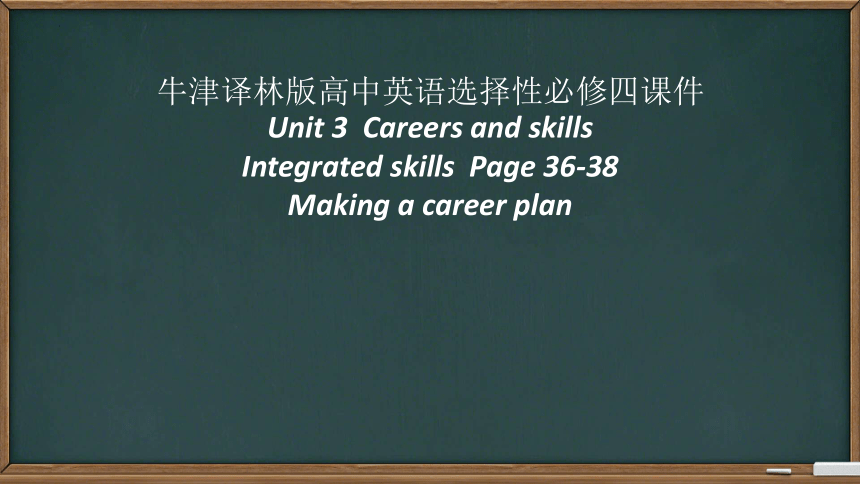 | |
| 格式 | pptx | ||
| 文件大小 | 261.1KB | ||
| 资源类型 | 教案 | ||
| 版本资源 | 牛津译林版(2019) | ||
| 科目 | 英语 | ||
| 更新时间 | 2025-07-17 11:26:42 | ||
图片预览

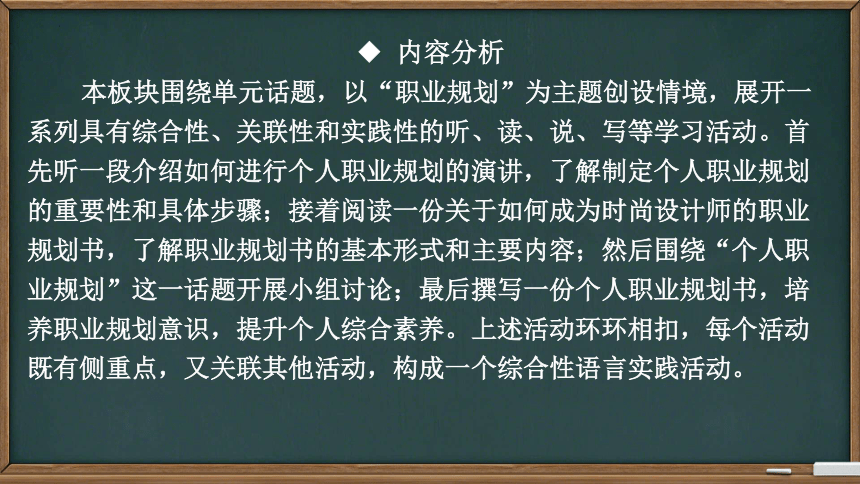
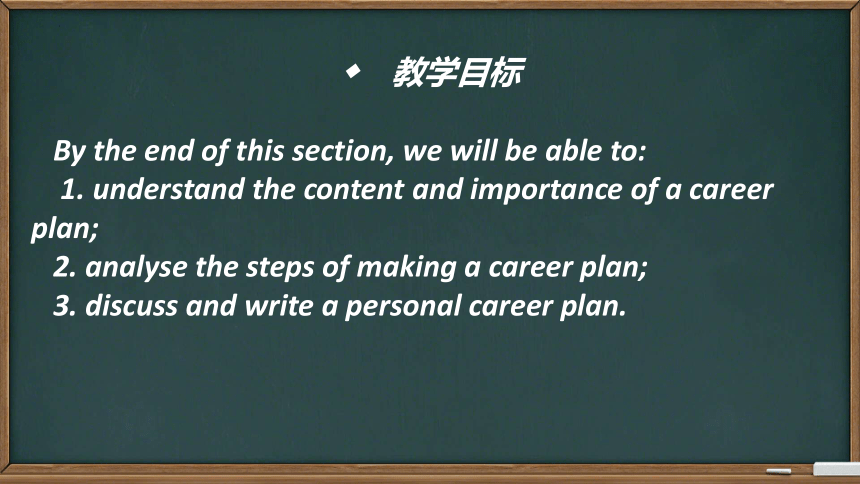
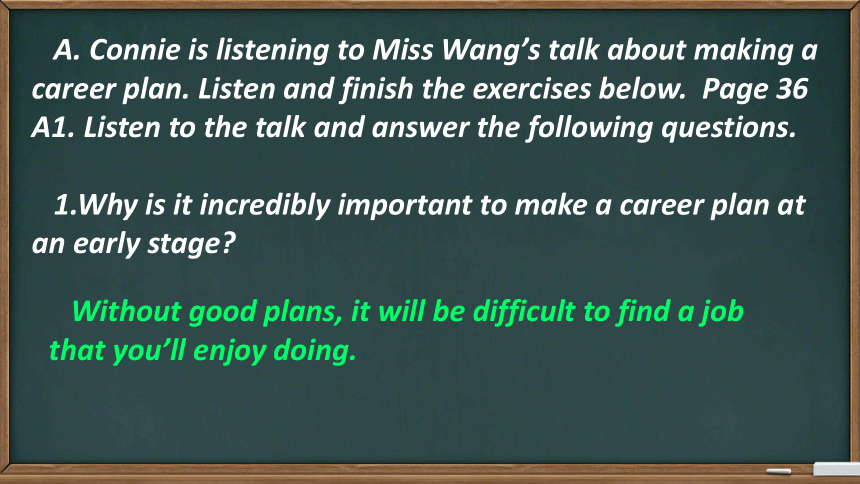
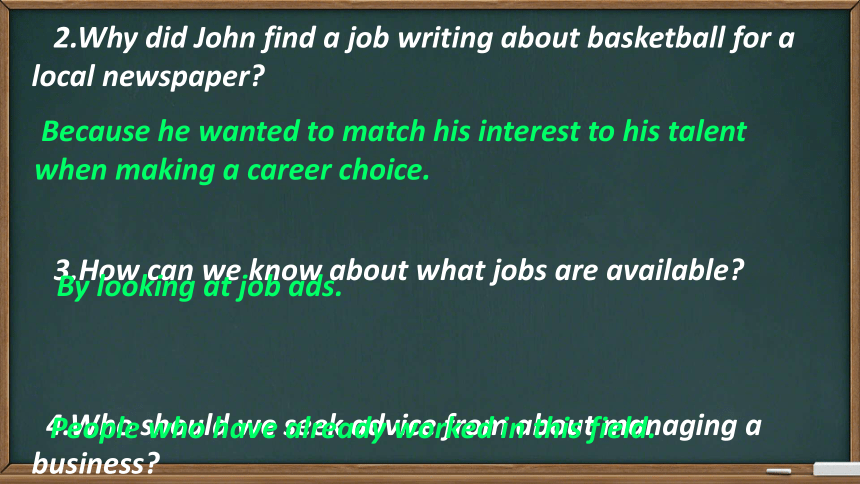
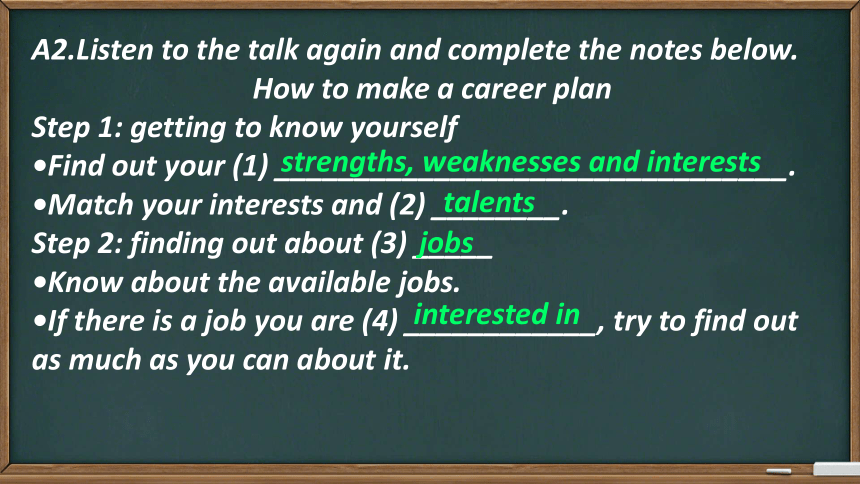
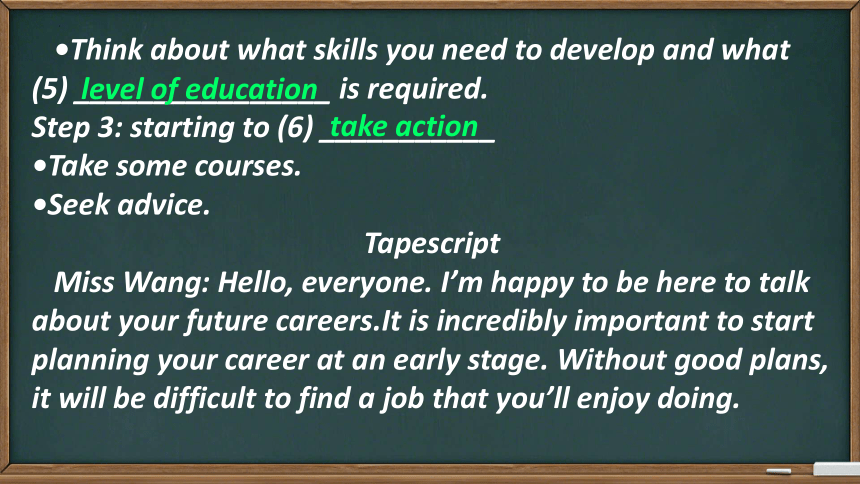
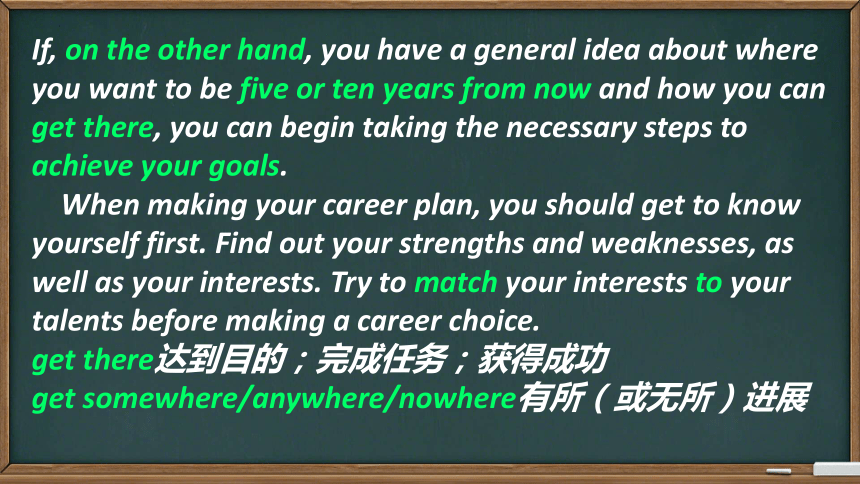
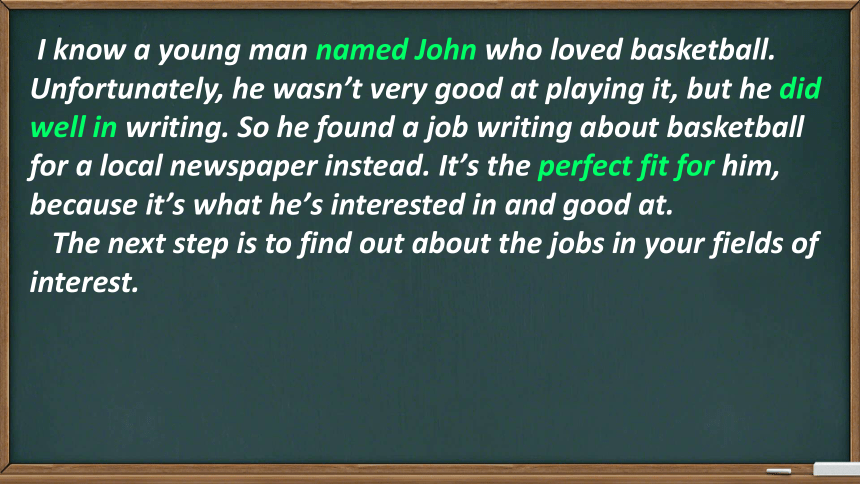
文档简介
(共28张PPT)
牛津译林版高中英语选择性必修四课件
Unit 3 Careers and skills
Integrated skills Page 36-38
Making a career plan
◆ 内容分析
本板块围绕单元话题,以“职业规划”为主题创设情境,展开一系列具有综合性、关联性和实践性的听、读、说、写等学习活动。首先听一段介绍如何进行个人职业规划的演讲,了解制定个人职业规划的重要性和具体步骤;接着阅读一份关于如何成为时尚设计师的职业规划书,了解职业规划书的基本形式和主要内容;然后围绕“个人职业规划”这一话题开展小组讨论;最后撰写一份个人职业规划书,培养职业规划意识,提升个人综合素养。上述活动环环相扣,每个活动既有侧重点,又关联其他活动,构成一个综合性语言实践活动。
◆ 教学目标
By the end of this section, we will be able to:
1. understand the content and importance of a career plan;
2. analyse the steps of making a career plan;
3. discuss and write a personal career plan.
A. Connie is listening to Miss Wang’s talk about making a career plan. Listen and finish the exercises below. Page 36
A1. Listen to the talk and answer the following questions.
1.Why is it incredibly important to make a career plan at an early stage
Without good plans, it will be difficult to find a job that you’ll enjoy doing.
2.Why did John find a job writing about basketball for a local newspaper
3.How can we know about what jobs are available
4.Who should we seek advice from about managing a business
Because he wanted to match his interest to his talent when making a career choice.
By looking at job ads.
People who have already worked in this field.
A2.Listen to the talk again and complete the notes below.
How to make a career plan
Step 1: getting to know yourself
Find out your (1) ________________________________.
Match your interests and (2) ________.
Step 2: finding out about (3) _____
Know about the available jobs.
If there is a job you are (4) ____________, try to find out as much as you can about it.
strengths, weaknesses and interests
talents
jobs
interested in
Think about what skills you need to develop and what
(5) ________________ is required.
Step 3: starting to (6) ___________
Take some courses.
Seek advice.
Tapescript
Miss Wang: Hello, everyone. I’m happy to be here to talk about your future careers.It is incredibly important to start planning your career at an early stage. Without good plans, it will be difficult to find a job that you’ll enjoy doing.
level of education
take action
If, on the other hand, you have a general idea about where you want to be five or ten years from now and how you can get there, you can begin taking the necessary steps to achieve your goals.
When making your career plan, you should get to know yourself first. Find out your strengths and weaknesses, as well as your interests. Try to match your interests to your talents before making a career choice.
get there达到目的;完成任务;获得成功
get somewhere/anywhere/nowhere有所(或无所)进展
I know a young man named John who loved basketball. Unfortunately, he wasn’t very good at playing it, but he did well in writing. So he found a job writing about basketball
for a local newspaper instead. It’s the perfect fit for him, because it’s what he’s interested in and good at.
The next step is to find out about the jobs in your fields of interest.
By looking at job ads, you can know about what jobs are available. If there is a particular job you are interested in, try to find out as much as you can about it, to see what skills you need to develop and what level of education is required.
Once you have this information, why not take action immediately For example, if you want to manage a business, it’s definitely a good idea to take some business courses. You should also try to seek advice from people who have already worked in this field.
If you follow these steps, you will be able to find a career that’s right for you.
B. After listening to Miss Wang’s talk, Connie wrote a career plan. Read the plan below and pay attention to how she planned her career.
Planning my career in fashion design
At the school Art Festival, I was asked to design the costumes for three school plays, which many of my classmates and teachers thought were nice and novel. Everyone was amazed to see the actors wear my costumes onstage.
This experience has made me realize that I am really good at drawing and have great talent for fashion design, and has inspired me to pursue fashion design as my career. That way, I can combine work with my interests and strengths.
To find out how to get into the field of fashion design, I did some research about what kind of education and skills I might need. I found out that many premier fashion designers studied at art institutes in London, Paris or Milan.
get into sth. 开始从事某职业;参与,开始(某事);对…产生兴趣;开始熟悉;学会
prem·ier / premi (r)/首要的;最著名的;最成功的;第一的
Milan/m l n/米兰
I also looked up job ads for the fashion industry to see what abilities or qualities designers should have. For example, they must have a good sense of colour and proportion, be familiar with various fabrics such as cotton, wool and man-made fibres, be able to recognize styles and trends, and be creative.
After much thought, I decided to develop these skills and get the right qualifications by studying art at university.
look sth up(在词典、参考书中或通过电脑)查阅,查检
While I am there, I would like to work part-time for a fashion design company in order to learn from professional designers
—more is better when it comes to work experience. I am also thinking about trying my hand at CAD, which is becoming more and more popular in the fashion industry. Actually, I do not have to wait until I go to university to swing into action as there will be a workshop in my city next month, which I am hoping to attend. try your hand at sth. (通常指初次) 尝试
CAD /k d/计算机辅助设计,电脑辅助设计(computer-aided design)
swing into action立即行动起来;马上大干起来
spring into action/spring into/to life突然工作(或行动)起来
After graduation, I will seek a job as a fashion designer. One day, I hope to start my own clothing company. Clothes with designer labels in shops are generally thought to be too expensive. I want to design fashionable clothes that ordinary people can afford. Hopefully, all of my planning and preparation will lead to a great career in fashion design.
start (sth) (up)(使)出现;发起;创办;开办
de·sign·er /d za n (r)/ 由著名设计师设计的;标有设计师姓名的;名牌的
designer labels设计师品牌
How Connie planned her career
1
2
3
She decided to pursue fashion design as her career.
She did some research about what kind of education and skills she might need.
She decided to develop these skills and get the right qualifications by studying art at university.
C. In pairs, discuss your career plans. Use the following questions and expressions to help you.
What are your interests and talents
What kind of career would you like Why do you think it is a good fit for you
How can you learn more about your chosen career
What steps can you take to achieve your goals
Expressions
Inviting someone to engage
Perhaps you can tell me more about ...
Maybe you can explain ...
Would you mind telling me ...
I’d like to know more about ...
What do you think of ...
Can you give an example of ...
Possible answer
A: To learn about your career plan, perhaps you can tell me more about your interests.
B: Sure. From a young age, I’ve loved animals and I’d often ask my parents to take me to nature parks and zoos.
A: Interesting! Can you give me an example of the kind of career you would like and tell me why it would be a good fit for you
B: Of course! When I was little, I decided that I wanted to be a vet, and that’s still my goal. It’s a good fit because I’m comfortable playing with and caring for animals.
A: Lovely. Have you found ways to learn more about this career For example,what education and skills are needed
B: Generally, most vets have a bachelor’s degree in veterinary science. Hands-on experience is equally important, for example, working at a vet clinic.
A: I can see you’ve done your research. Would you mind telling me what steps you can take to achieve your goal
vet·er·in·ary / vetnri/ / vetr n ri/ adj. 兽医的
hands-on动手的;实际操作的
B: I have a step-by-step plan that includes successfully completing a bachelor’s degree in veterinary science, which takes four to five years.
A: However, to get into university, preparation will need to start in high school. Isn’t an outstanding academic performance essential
B: Yes. I must get excellent grades in all my subjects.
step-by-step按部就班的,循序渐进的
Besides, I want to do volunteer work at the local vet clinic in my spare time, so I can observe qualified vets at work and gain experience.
A: I imagine that kind of experience will help you in your studies.
B: Exactly! For now, I’m going to ask my parents if I can get a cat. This will teach me responsibility and basic animal care.
A: It’s clear that you know what you need to do to achieve your goal. I wish you the best of luck!
quali·fied / kw l fa d/ 具备…的学历(或资历);具备…的知识(或技能);符合资格
D. Write your career plan. Use your ideas from part C and the information in parts A and B to help you.
Planning your writing
Learning about the structure
To write a career plan, you can follow the structure below:
Express your idea about your career goal.
Explain your step-by-step plan. Identify the barriers that you might face and state how you can overcome them.
Conclude with your hopes for the future.
bar·rier / b ri (r)/ 障碍;阻力;关卡
Learning about the language
Your plan should be easy to understand and follow. You can use expressions like to start with, then, next, last but not least. Pay attention to the tense and remember to be objective and positive.
Checking your writing
Remember to check your writing after you finish and exchange drafts between you and your partner. Pay attention to the following aspects:
Punctuation Spelling Grammar Choice of words
Style (formal/informal) Structure
Self-review
Is your plan clear and easy to follow
What mistakes are there in your writing How do you correct them
Peer review
Does your partner think your plan is practical
What suggestions does your partner give on improving your career plan
My career plan
From a very young age, I have loved animals. I would ask my parents to take me to nature parks and zoos. I wanted to be one of the staff playing with and caring for the animals! I decided that I wanted to be a vet one day and that is my goal still.
To make my childhood dream come true, I found out that I should pursue a degree in veterinary science at university. After four to five years of successful study, I would be awarded a bachelor’s degree in veterinary science.
However, entry into university can be highly competitive. I will need to prepare myself in high school and work hard to produce an outstanding academic performance.
Other than following the right course of study, I can do volunteer work at a vet clinic in my spare time. Working at the clinic will give me time to observe qualified vets at work and find out the answers to the many questions I will be faced with.
com·peti·tive /k m pet t v/ 竞争的
other than除…以外;不同;不同于;不
The clinic will also provide me with many practical skills, which I could use to get through my theoretical studies and pass all my courses successfully.
For now, I am going to ask my parents if I can keep a cat. Having a pet of my own will teach me responsibility and basic animal care. In the future, when working as a vet, I will probably take care of animals of different species. It will be challenging but rewarding at the same time.
get through sth.顺利通过(考试等)
the·or·etic·al / θ ret kl/ adj.理论上的
牛津译林版高中英语选择性必修四课件
Unit 3 Careers and skills
Integrated skills Page 36-38
Making a career plan
◆ 内容分析
本板块围绕单元话题,以“职业规划”为主题创设情境,展开一系列具有综合性、关联性和实践性的听、读、说、写等学习活动。首先听一段介绍如何进行个人职业规划的演讲,了解制定个人职业规划的重要性和具体步骤;接着阅读一份关于如何成为时尚设计师的职业规划书,了解职业规划书的基本形式和主要内容;然后围绕“个人职业规划”这一话题开展小组讨论;最后撰写一份个人职业规划书,培养职业规划意识,提升个人综合素养。上述活动环环相扣,每个活动既有侧重点,又关联其他活动,构成一个综合性语言实践活动。
◆ 教学目标
By the end of this section, we will be able to:
1. understand the content and importance of a career plan;
2. analyse the steps of making a career plan;
3. discuss and write a personal career plan.
A. Connie is listening to Miss Wang’s talk about making a career plan. Listen and finish the exercises below. Page 36
A1. Listen to the talk and answer the following questions.
1.Why is it incredibly important to make a career plan at an early stage
Without good plans, it will be difficult to find a job that you’ll enjoy doing.
2.Why did John find a job writing about basketball for a local newspaper
3.How can we know about what jobs are available
4.Who should we seek advice from about managing a business
Because he wanted to match his interest to his talent when making a career choice.
By looking at job ads.
People who have already worked in this field.
A2.Listen to the talk again and complete the notes below.
How to make a career plan
Step 1: getting to know yourself
Find out your (1) ________________________________.
Match your interests and (2) ________.
Step 2: finding out about (3) _____
Know about the available jobs.
If there is a job you are (4) ____________, try to find out as much as you can about it.
strengths, weaknesses and interests
talents
jobs
interested in
Think about what skills you need to develop and what
(5) ________________ is required.
Step 3: starting to (6) ___________
Take some courses.
Seek advice.
Tapescript
Miss Wang: Hello, everyone. I’m happy to be here to talk about your future careers.It is incredibly important to start planning your career at an early stage. Without good plans, it will be difficult to find a job that you’ll enjoy doing.
level of education
take action
If, on the other hand, you have a general idea about where you want to be five or ten years from now and how you can get there, you can begin taking the necessary steps to achieve your goals.
When making your career plan, you should get to know yourself first. Find out your strengths and weaknesses, as well as your interests. Try to match your interests to your talents before making a career choice.
get there达到目的;完成任务;获得成功
get somewhere/anywhere/nowhere有所(或无所)进展
I know a young man named John who loved basketball. Unfortunately, he wasn’t very good at playing it, but he did well in writing. So he found a job writing about basketball
for a local newspaper instead. It’s the perfect fit for him, because it’s what he’s interested in and good at.
The next step is to find out about the jobs in your fields of interest.
By looking at job ads, you can know about what jobs are available. If there is a particular job you are interested in, try to find out as much as you can about it, to see what skills you need to develop and what level of education is required.
Once you have this information, why not take action immediately For example, if you want to manage a business, it’s definitely a good idea to take some business courses. You should also try to seek advice from people who have already worked in this field.
If you follow these steps, you will be able to find a career that’s right for you.
B. After listening to Miss Wang’s talk, Connie wrote a career plan. Read the plan below and pay attention to how she planned her career.
Planning my career in fashion design
At the school Art Festival, I was asked to design the costumes for three school plays, which many of my classmates and teachers thought were nice and novel. Everyone was amazed to see the actors wear my costumes onstage.
This experience has made me realize that I am really good at drawing and have great talent for fashion design, and has inspired me to pursue fashion design as my career. That way, I can combine work with my interests and strengths.
To find out how to get into the field of fashion design, I did some research about what kind of education and skills I might need. I found out that many premier fashion designers studied at art institutes in London, Paris or Milan.
get into sth. 开始从事某职业;参与,开始(某事);对…产生兴趣;开始熟悉;学会
prem·ier / premi (r)/首要的;最著名的;最成功的;第一的
Milan/m l n/米兰
I also looked up job ads for the fashion industry to see what abilities or qualities designers should have. For example, they must have a good sense of colour and proportion, be familiar with various fabrics such as cotton, wool and man-made fibres, be able to recognize styles and trends, and be creative.
After much thought, I decided to develop these skills and get the right qualifications by studying art at university.
look sth up(在词典、参考书中或通过电脑)查阅,查检
While I am there, I would like to work part-time for a fashion design company in order to learn from professional designers
—more is better when it comes to work experience. I am also thinking about trying my hand at CAD, which is becoming more and more popular in the fashion industry. Actually, I do not have to wait until I go to university to swing into action as there will be a workshop in my city next month, which I am hoping to attend. try your hand at sth. (通常指初次) 尝试
CAD /k d/计算机辅助设计,电脑辅助设计(computer-aided design)
swing into action立即行动起来;马上大干起来
spring into action/spring into/to life突然工作(或行动)起来
After graduation, I will seek a job as a fashion designer. One day, I hope to start my own clothing company. Clothes with designer labels in shops are generally thought to be too expensive. I want to design fashionable clothes that ordinary people can afford. Hopefully, all of my planning and preparation will lead to a great career in fashion design.
start (sth) (up)(使)出现;发起;创办;开办
de·sign·er /d za n (r)/ 由著名设计师设计的;标有设计师姓名的;名牌的
designer labels设计师品牌
How Connie planned her career
1
2
3
She decided to pursue fashion design as her career.
She did some research about what kind of education and skills she might need.
She decided to develop these skills and get the right qualifications by studying art at university.
C. In pairs, discuss your career plans. Use the following questions and expressions to help you.
What are your interests and talents
What kind of career would you like Why do you think it is a good fit for you
How can you learn more about your chosen career
What steps can you take to achieve your goals
Expressions
Inviting someone to engage
Perhaps you can tell me more about ...
Maybe you can explain ...
Would you mind telling me ...
I’d like to know more about ...
What do you think of ...
Can you give an example of ...
Possible answer
A: To learn about your career plan, perhaps you can tell me more about your interests.
B: Sure. From a young age, I’ve loved animals and I’d often ask my parents to take me to nature parks and zoos.
A: Interesting! Can you give me an example of the kind of career you would like and tell me why it would be a good fit for you
B: Of course! When I was little, I decided that I wanted to be a vet, and that’s still my goal. It’s a good fit because I’m comfortable playing with and caring for animals.
A: Lovely. Have you found ways to learn more about this career For example,what education and skills are needed
B: Generally, most vets have a bachelor’s degree in veterinary science. Hands-on experience is equally important, for example, working at a vet clinic.
A: I can see you’ve done your research. Would you mind telling me what steps you can take to achieve your goal
vet·er·in·ary / vetnri/ / vetr n ri/ adj. 兽医的
hands-on动手的;实际操作的
B: I have a step-by-step plan that includes successfully completing a bachelor’s degree in veterinary science, which takes four to five years.
A: However, to get into university, preparation will need to start in high school. Isn’t an outstanding academic performance essential
B: Yes. I must get excellent grades in all my subjects.
step-by-step按部就班的,循序渐进的
Besides, I want to do volunteer work at the local vet clinic in my spare time, so I can observe qualified vets at work and gain experience.
A: I imagine that kind of experience will help you in your studies.
B: Exactly! For now, I’m going to ask my parents if I can get a cat. This will teach me responsibility and basic animal care.
A: It’s clear that you know what you need to do to achieve your goal. I wish you the best of luck!
quali·fied / kw l fa d/ 具备…的学历(或资历);具备…的知识(或技能);符合资格
D. Write your career plan. Use your ideas from part C and the information in parts A and B to help you.
Planning your writing
Learning about the structure
To write a career plan, you can follow the structure below:
Express your idea about your career goal.
Explain your step-by-step plan. Identify the barriers that you might face and state how you can overcome them.
Conclude with your hopes for the future.
bar·rier / b ri (r)/ 障碍;阻力;关卡
Learning about the language
Your plan should be easy to understand and follow. You can use expressions like to start with, then, next, last but not least. Pay attention to the tense and remember to be objective and positive.
Checking your writing
Remember to check your writing after you finish and exchange drafts between you and your partner. Pay attention to the following aspects:
Punctuation Spelling Grammar Choice of words
Style (formal/informal) Structure
Self-review
Is your plan clear and easy to follow
What mistakes are there in your writing How do you correct them
Peer review
Does your partner think your plan is practical
What suggestions does your partner give on improving your career plan
My career plan
From a very young age, I have loved animals. I would ask my parents to take me to nature parks and zoos. I wanted to be one of the staff playing with and caring for the animals! I decided that I wanted to be a vet one day and that is my goal still.
To make my childhood dream come true, I found out that I should pursue a degree in veterinary science at university. After four to five years of successful study, I would be awarded a bachelor’s degree in veterinary science.
However, entry into university can be highly competitive. I will need to prepare myself in high school and work hard to produce an outstanding academic performance.
Other than following the right course of study, I can do volunteer work at a vet clinic in my spare time. Working at the clinic will give me time to observe qualified vets at work and find out the answers to the many questions I will be faced with.
com·peti·tive /k m pet t v/ 竞争的
other than除…以外;不同;不同于;不
The clinic will also provide me with many practical skills, which I could use to get through my theoretical studies and pass all my courses successfully.
For now, I am going to ask my parents if I can keep a cat. Having a pet of my own will teach me responsibility and basic animal care. In the future, when working as a vet, I will probably take care of animals of different species. It will be challenging but rewarding at the same time.
get through sth.顺利通过(考试等)
the·or·etic·al / θ ret kl/ adj.理论上的
同课章节目录
